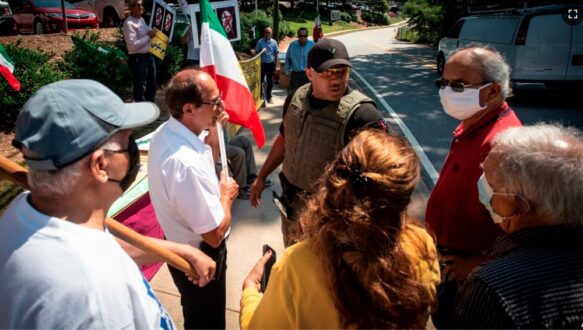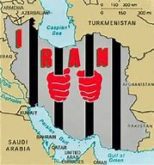voanews – The Biden administration will again allow Iran to run absentee voter stations on U.S. soil for next week’s Iranian presidential election, VOA has learned, prompting the Islamic republic’s critics to denounce the plan as absurd and shameful.
Iranian Foreign Ministry official Alireza Mahmoudi told state media on Sunday that Tehran is planning to set up more than 30 ballot stations across the United States for the June 28 vote to replace Iranian President Ebrahim Raisi, who died in a helicopter crash last month.
Mahmoudi said ballot boxes for Iranian absentee voters would be set up at the Iranian Interests Section of the Pakistani embassy in Washington and in New York but did not identify other locations.
Iranian state media say the United States is home to the largest proportion of overseas-based Iranians at 30%. The U.S. Census Bureau’s American Community Survey estimates there are about half a million people born in Iran or of Iranian origin in the U.S., while the Iranian American nonprofit group National Union for Democracy in Iran, or NUFDI, says it has a higher estimate of more than 1 million.
Canada and Turkey follow with 12% shares of the Iranian diaspora, according to Iranian state media. Mahmoudi said Iran is arranging absentee voting in other diaspora locations as well.
In a statement reported exclusively by VOA, the U.S. State Department said on Friday it has no expectation that Iran’s presidential election will be free or fair. The Islamic republic’s ruling clerics permit only loyalists of Supreme Leader Ayatollah Ali Khamenei to run for offices such as president and parliament, which are subservient to him on key policy issues.
Iran’s last parliamentary and presidential elections, in March and 2021, respectively, drew record-low official turnouts, with the lack of choices leaving much of the electorate disinterested.
Opponents of Iran’s clerical rulers at home and abroad repeatedly have called for boycotts of Iranian elections, which they view as shams, and they have done so again for the June 28 vote. They also have noted that the Islamic republic seeks legitimacy for its 45-year authoritarian rule by trying to boost turnout for such elections.
VOA asked the State Department how authorizing ballot stations in the U.S. for Iran, whose poor human rights record it has strongly criticized, is consistent with the U.S. view of Iranian elections as neither free nor fair.
A spokesperson responded by noting that Iran set up U.S.-based ballot stations for previous presidential elections, in 2021 and 2017, with approval from the Biden administration and its predecessor, the Trump administration, respectively.
“This is nothing new,” the spokesman said, in reference to the planned ballot stations for next week’s vote.
Richard Goldberg, a senior adviser to the Washington-based Foundation for Defense of Democracies, countered that permitting Iran to engage in another round of absentee balloting on U.S. soil is a “theater of the absurd.”
In a statement to VOA, Goldberg wrote: “How and why we would facilitate such a charade for a state sponsor of terrorism that is hunting Americans every day is beyond me.” He also questioned who would be operating Iran’s ballot stations in the U.S. and what relationship they have to the Iranian government.
VOA put those questions to Iran’s U.N. mission, which responded by saying it declines to comment because it “believes the issue is not of interest to an American audience.”
A day before Iran’s 2021 presidential election, the Iranian Interests Section in Washington published an online chart showing the addresses of ballot stations in 29 U.S. cities where Iranian citizens could vote. Besides the Interests Section, the other listed venues included 20 properties of U.S. and British hotel companies and eight Islamic centers. There was no indication of who operated the stations.
VOA contacted three hotels that hosted the 2021 ballot stations on Friday to ask if they were planning to host such stations again next week. Staff members who answered the phones at the Marriott Spring Hill Suites in Gaithersburg, Maryland, and at the Hilton Garden Inn Irvine-Orange County Airport in California said they had no record of such events on their schedules. A woman who answered the phone at the Comfort Inn Sandy Springs in Atlanta, Georgia, repeatedly hung up when asked if it is hosting an event next Friday.
Cameron Khansarinia, vice president of the Iranian American group NUFDI, told VOA that diaspora Iranians have a responsibility to protest the Islamic republic’s “shameful” absentee voter stations wherever they are set up.
In reference to those who operate and vote at the planned ballot stations, Khansarinia said, “While we should respect the physical safety of these individuals and U.S. law, they deserve to be publicly shamed for their absolutely amorality.”
VOA also asked the State Department whether U.S. authorities have granted licenses to businesses and nonprofit groups that plan to host the Iranian ballot stations to exempt them from U.S. sanctions that generally prohibit the provision of commercial services to Iran.
The spokesperson replied, “Foreign governments carrying out election-related activities in the U.S. must do so in a manner consistent with U.S. law and regulations.”
The Treasury Department did not respond to similar questions sent by VOA on Tuesday, regarding the granting of licenses for Iranian ballot stations.
Brian O’Toole, a former senior adviser in the Treasury Department’s Office of Foreign Assets Control, or OFAC, told VOA it is a gray area.
O’Toole, a nonresident senior fellow at the Washington-based Atlantic Council, identified two U.S. regulations, OFAC’s General License E and the Code of Federal Regulations section 560.545, as potentially permitting election activity and democracy-building in Iran.
“Despite the Iranian government’s issues with elections, the U.S. has a clear interest in promoting democracy,” said O’Toole, who managed OFAC’s sanctions program during former President Barack Obama’s administration.
“What this administration probably would lean toward is the principle that people who are eligible to vote [in Iran’s election] should make the decision as to whether they should or should not,” he said.
 Shabtabnews In this dark night, I have lost my way – Arise from a corner, oh you the star of guidance.
Shabtabnews In this dark night, I have lost my way – Arise from a corner, oh you the star of guidance.



